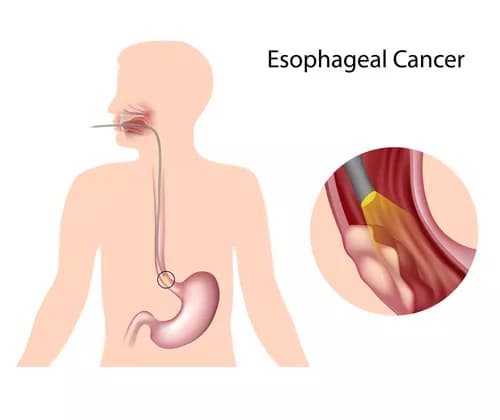
PET Scans Can Inform and Improve Treatment For Patients With Esophageal Cancer
ALEXANDRIA, Va. – Findings from a federally funded clinical trial point to a new way to improve the outlook for patients with esophageal cancer: using PET scans to assess tumor response to initial chemotherapy may allow doctors to tailor further chemotherapy. Despite aggressive combined modality treatment with chemotherapy, radiation therapy, and surgery, the prognosis for patients with esophageal cancer is poor, with fewer than 50% surviving at five years after diagnosis. Ways to monitor treatment effectiveness are urgently needed to improve outcomes. The study will be presented at the upcoming 2017 Gastrointestinal Cancers Symposium in San Francisco.
Patients with stage II-III esophageal and gastroesophageal junction (GEJ) cancers typically receive 5.5 weeks of chemotherapy with radiation (“chemoradiation”), followed by surgery. Use of chemoradiation before surgery has been shown to improve survival compared to surgery alone. Several chemotherapy regimens are available for use during chemoradiation, but doctors have no reliable method to predict whether a particular chemotherapy will be effective in a given patient.
“In this study, we are adding induction chemotherapy before chemoradiation and showing that using PET scans after the induction chemotherapy to assess response can help doctors make quick course corrections to maximize patient benefit from chemotherapy,” said Karyn A. Goodman, MD, a radiation oncologist at the University of Colorado School of Medicine in Aurora, CO. “Although our approach does lengthen a patient’s time before surgery, we found that assessing treatment efficacy by PET scans can improve the efficacy of the treatment as shown by the ability to achieve a pathologic complete response, meaning there were no traces of cancer in the tissue specimen taken at the time of surgery.”
PET scans are routinely used to guide therapy decisions in lymphoma but are only beginning to be explored for this purpose in solid tumors. This study is among the first to show the benefit of PET imaging in directing pre-surgery treatment decisions for esophageal cancer.
The Study
Following an initial PET scan, 257 patients with stage II-III esophageal and GEJ adenocarcinoma were randomly assigned to one of two induction chemotherapy regimens: modified FOLFOX-6 or carboplatin/paclitaxel. A PET scan was repeated after the first few cycles of induction therapy. If the PET scan suggested that the induction chemotherapy had worked, patients continued with the same chemotherapy regimen during chemoradiation.
If the PET scan revealed that the induction chemotherapy regimen was not effective, chemotherapy was changed to the other of the two regimens during chemoradiation. Overall, 39 out of 129 patients who received FOLFOX induction chemotherapy, and 49 out of 128 patients who received carboplatin/paclitaxel, switched chemotherapy regimens after the PET scan.
Key Findings
Among the patients who switched to an alternative chemotherapy after induction therapy, 15.6% ultimately achieved a pathologic complete response. In prior studies, where pre-surgery chemotherapy was not changed based on a PET scan, the complete pathologic response rate among patients with tumors not responsive to induction chemotherapy as measured by PET scan was only 5%. Prior research suggested a link between pathologic complete response and longer survival in this cancer.
Next Steps
PET scans are covered by Medicare for staging and evaluation of treatment response for esophageal and GE junction cancers. This study shows that PET scans can be used going forward to help guide therapy decisions for patients with esophageal and GEJ cancers. “However, we still need to further refine what is the most effective regimen for this disease,” said Dr. Goodman.
About Esophageal and GEJ Cancers
Worldwide, 400,000 people die of esophageal cancer every year.1 In the United States, the rates of esophageal and GEJ cancers have been rising since the 1970s. An estimated 17,000 people were diagnosed with esophageal cancer in 2016 in the United States, and 16,000 died of the disease.2 The most common type in the United States is adenocarcinoma, accounting for 70% of esophageal cancers.
This study was supported by grants from the National Institutes for Health.
Materials provided by American Society of Clinical Oncology. Note: Content may be edited for style and length.
Disclaimer: DoveMed is not responsible for the accuracy of the adapted version of news releases posted to DoveMed by contributing universities and institutions.
Related Articles
Test Your Knowledge
Asked by users
Related Centers
Related Specialties
Related Physicians
Related Procedures
Related Resources
Join DoveHubs
and connect with fellow professionals

0 Comments
Please log in to post a comment.